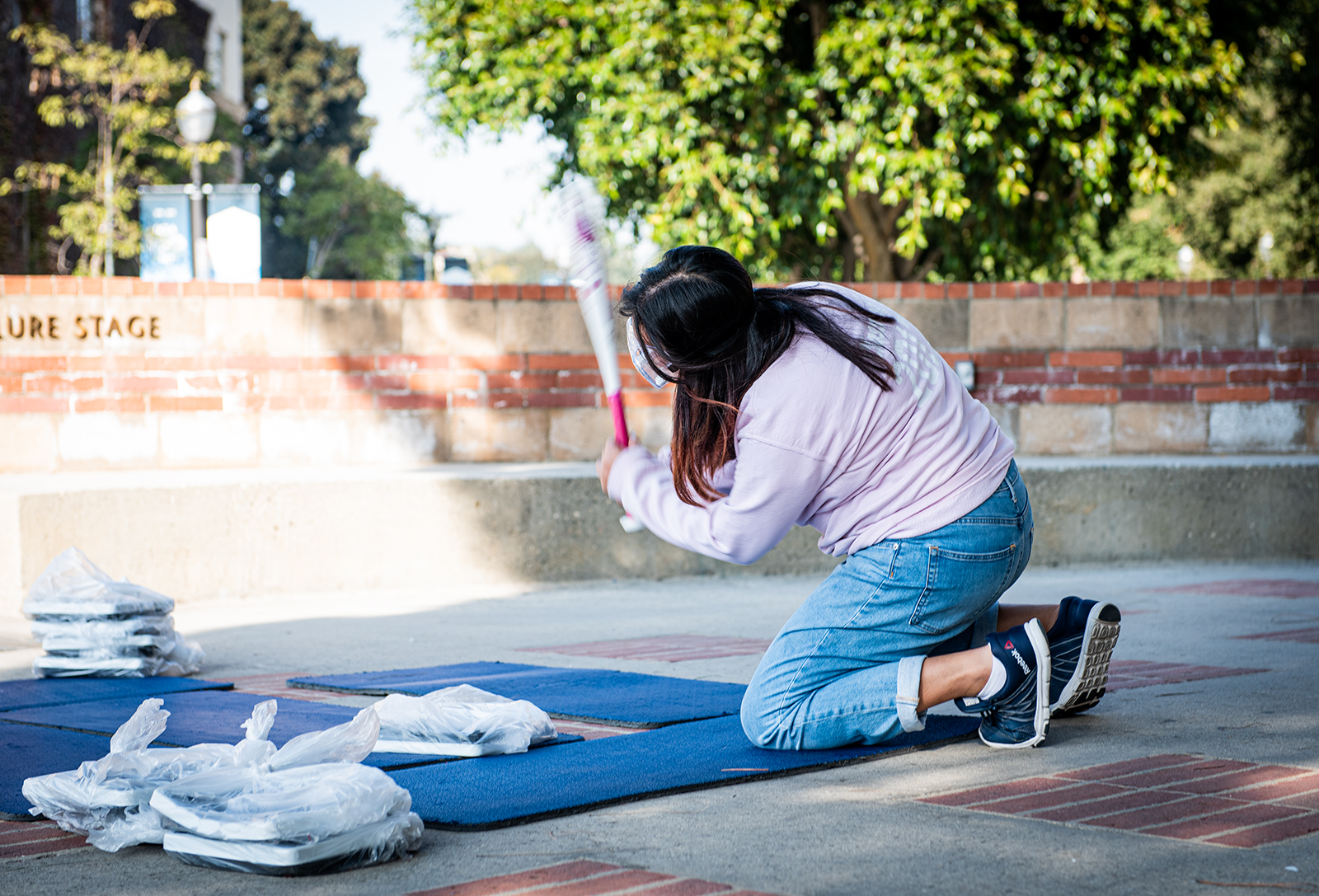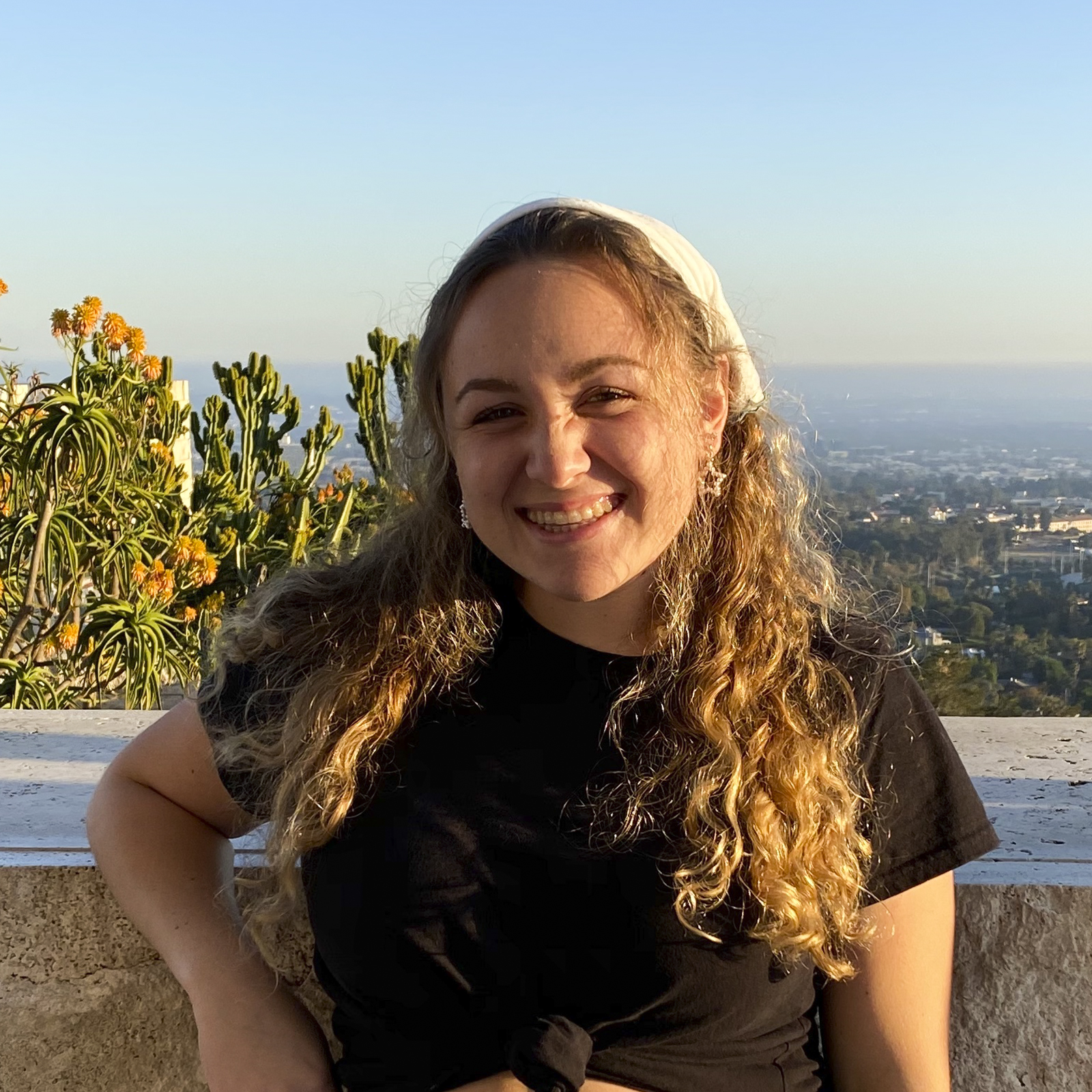Weeklong event aims to promote body positivity while taking on diet culture

Students smashed bathroom scales with baseball bats as part of the Body Image Task Force’s “I Love My Body Week.” The scale-smashing event was co-hosted by Southern Smash, a group that travels to college campuses across California to foster self-worth by inviting students to smash scales. (Lauren Man/Daily Bruin)
Buddy Al-Aydi, a second-year English student, threw his backpack to the side of the Bruin Walk stage and ran up to grab a metal baseball bat. He brought the bat down on a bathroom scale on the stage and the piercing sound of metal colliding rang through Bruin Plaza.
“By smashing that scale, it shows that it doesn’t matter if the (scale) numbers go down or not,” Al-Aydi said after climbing down. “It’s what you’re doing, in terms of how you take care of your body (that matters).”
A dozen scales were smashed by over 100 peopleduring “I Love My Body Week,” which took place from Jan. 13 to Jan. 17. The week was hosted by the Undergraduate Students Association Council Student Wellness Commission’s Body Image Task Force.
Other events included a walk-in exhibition on international beauty standards, a dance class taught in high heels, a panel on boosting sexual confidence and a lecture about misconceptions surrounding dieting.
Body Image Task Force co-directors fourth-year sociology and gender studies student Helen Zhong and third-year financial actuarial mathematics student Lorena Palattao planned the week to create an open space to help students feel safe talking about their vulnerabilities and achieve self-love.
“I definitely think that a lot of people dismiss body image as a very niche topic, but the truth is we all live in such an intense diet culture,” Zhong said. “It’s really hard to find someone, especially a woman, who doesn’t exhibit some kind of disordered eating, and it’s really relevant to everyone.”
To encourage body positivity, many events focused on dispelling the effects of diet culture and weight loss efforts.
Students may feel pressure to diet because of social media or advertising influences, said presenters at a workshop called “Debunking Diet Myths,” which took place Jan. 14.
“At UCLA, there is extra pressure (to diet) because when you walk on campus, there seems to be a lot of people that fit the LA mold that are very concentrated on that little plot of land,” said Eve Lahijani, a nutrition therapist who spoke at the event. “Even when you look at the ads on UCLA campus, … they are all (of) athletes – people who are in excellent shape, all have a certain body type, totally athletic.”
However, diets perpetuate a cycle of self-hate, as failure to uphold dietary restrictions often leads dieters into guilt, shame and ultimately more binging, Lahijani said.
Instead of restricting certain foods from your diet, prioritizing the addition of healthy foods is more effective in maintaining mental and physical wellness, said Elena Eu, Body Image Task Force research director and fourth-year psychology student.
Eu researched common flaws in popular diets and presented them on poster boards for attendees to browse. For example, many diets teach dieters to ignore hunger, but by ignoring hunger, a dieter also teaches their body to ignore fullness, Lahijani said.
“At the end of the day, you’re going to eat thousands and thousands of meals in your life, and you don’t need to give each one so much weight,” Eu said. “It’s important to know that freedom from obsession with food is possible, and it’s definitely a journey, but self-educating like this is one way to start.”
Dongni Zheng, a second-year public health student who attended the event, said she was surprised to learn that all diets can be bad for one’s health.
“Before I came, I expected to learn some good diets from this event, but the nutritionist actually talked about why they don’t work,” Zheng said.
The scale-smashing event, hosted Jan. 15 on Bruin Walk, was intended to help release frustrations associated with dissatisfaction with weight standards. The event was co-hosted by the Body Image Task Force and Southern Smash, a nonprofit that travels to college campuses hoping to redefine self-worth by inviting students to smash scales.
Other events aimed to help students feel more comfortable using their bodies in sexual ways.
At an event called “Crafting Confidence in the Bedroom,” co-hosted by Sexperts at UCLA and the task force, speakers offered suggestions to overcome doubts and apprehensions about sex.
Students were provided handouts that asked questions such as, “What food would be your go-to sexy food?” Answers included multiple-choice options such as “whipped cream” and “lollipops, peaches, or other erotically shaped foods.”
Third-year political science student Yoyo Wong said she thought that the event helped to destigmatize sex as a topic.
“People might feel embarrassed to talk about (sex), but in this open forum it teaches you to be comfortable with talking about something that is really important to know about,” Wong said. “It’s really okay to let go of your worries in the bedroom.”
A heels dancing workshop held Jan. 15 also aimed to promote self-confidence. Students strapped on heels and joined instructor Shawna Pops on the dance floor to learn a short choreography that was recorded at the end of the class.
“Heels dancing is owning your body and embracing the beauty of it,” Palattao said. “A lot of people think it’s provocative, but it’s not, so we just wanted to have a class where people could use a form of art to embrace who they are and see the beauty of their bodies.”
The week finished off with a walk-in gallery in Kerckhoff Hall titled “Unfollowing Beauty Standards.” The artwork aimed to highlight and contrast the beauty standards of different cultures across the globe.
Awareness of worldwide beauty standards will foster a more accepting student body said Amirah Nathani, a fourth-year psychology student and Body Image Task Force membership co-director.
“We tend to fall into what we’re comfortable with, (which is) often what we’ve grown up around or what we see most often,” Nathani said. “I really want people to see that the worldis so much more different than what you as an individual know.”
Despite the gravity of body image and its effect on mental health, Zhong said she hoped the week could be a joyous celebration of positivity and self-acceptance.
“I would want people who come to leave with a newfound appreciation for their bodies and for all that their body does for them,” Zhong said. “Hopefully, they will learn to not compare themselves to others or social media, to be kind to themselves and to show their bodies compassion, whether that’s eating when you’re hungry or not going to the gym if you’re tired.”



